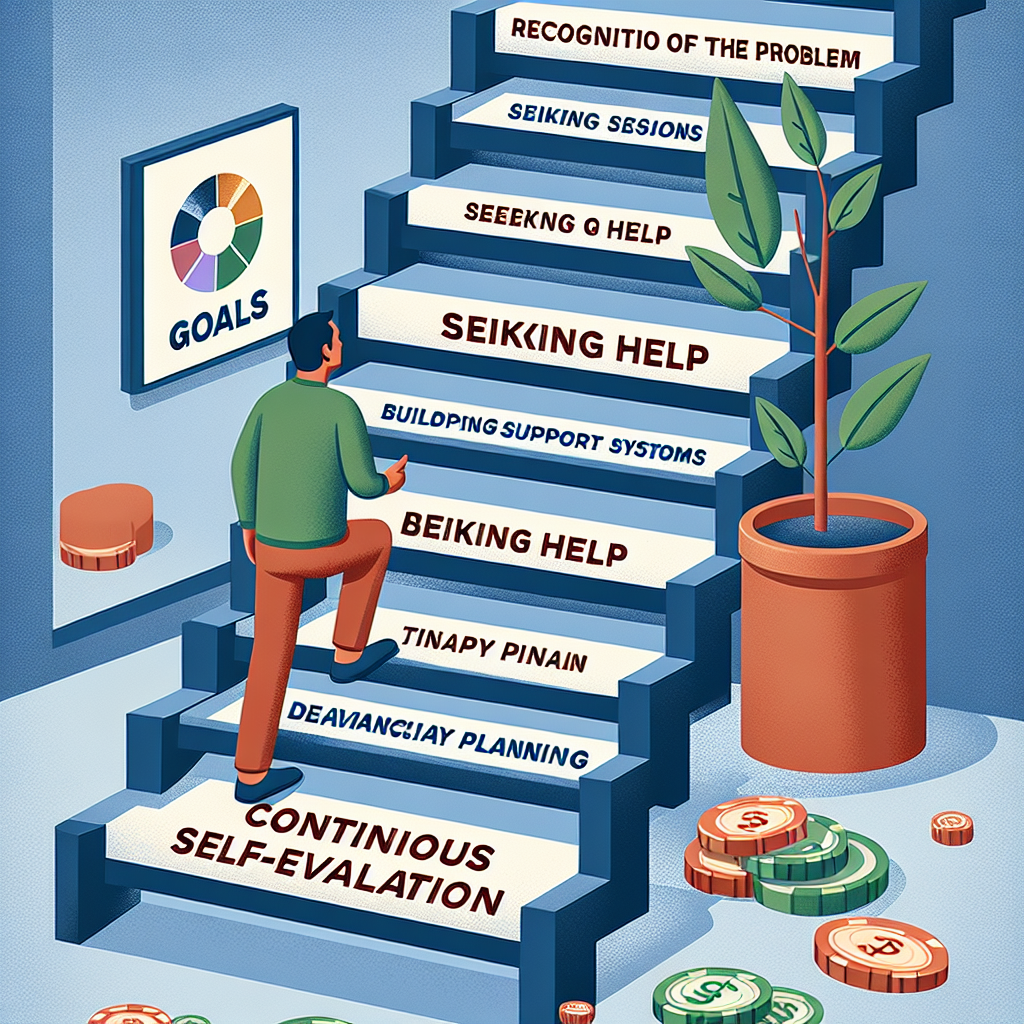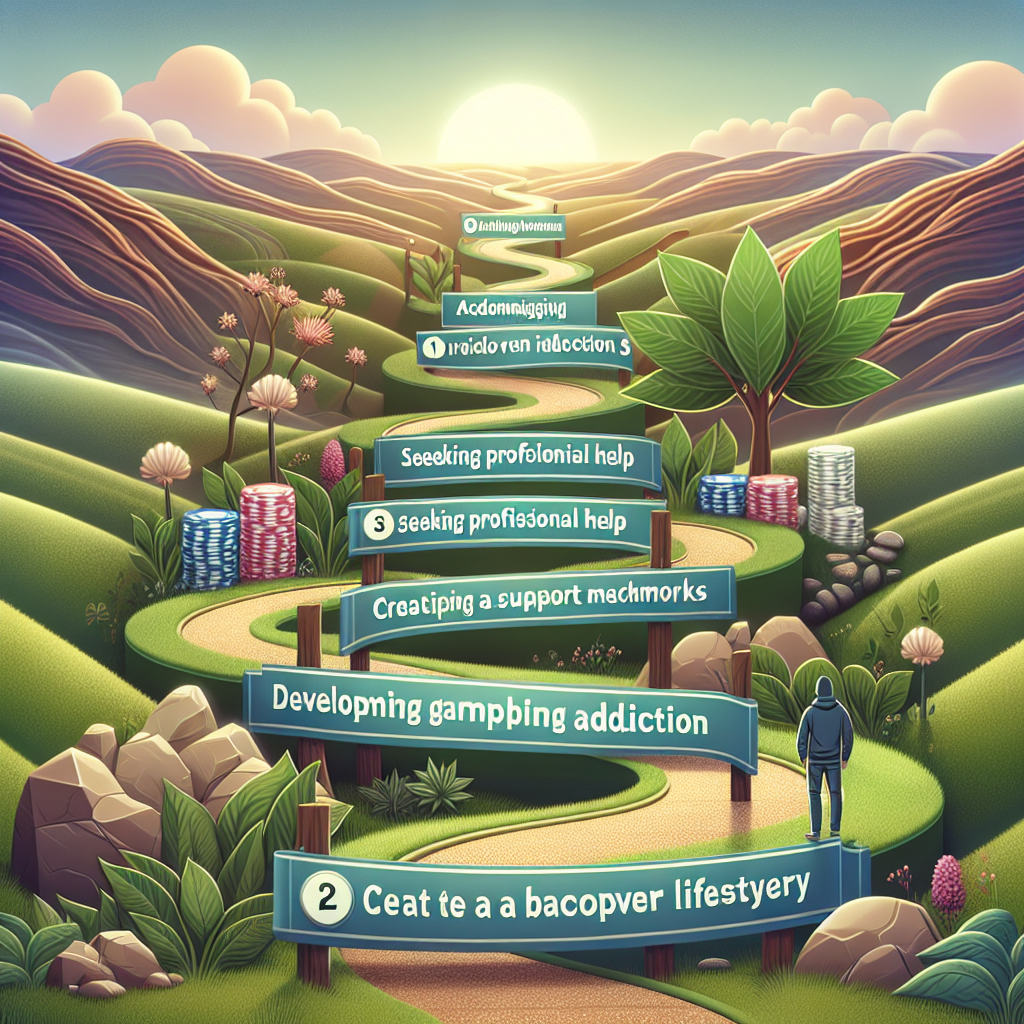-
Table of Contents

“Set achievable milestones, embrace progress, and reclaim control.”
Introduction
Setting realistic goals for gambling addiction recovery involves a structured and mindful approach to ensure sustainable progress and long-term success. The process begins with acknowledging the addiction and understanding its impact on one’s life. It is crucial to set specific, measurable, achievable, relevant, and time-bound (SMART) goals that provide clear direction and motivation. Seeking professional help, such as therapy or support groups, can offer guidance and accountability. Additionally, breaking down larger goals into smaller, manageable steps can make the recovery journey less overwhelming. Regularly reviewing and adjusting goals as needed helps maintain focus and adaptability. By fostering a supportive environment and celebrating small victories, individuals can build confidence and resilience in their path to recovery.
Steps To Setting Realistic Goals For Gambling Addiction Recovery
Setting realistic goals is a crucial step in the journey to recover from gambling addiction. It provides a clear roadmap and a sense of direction, which can be incredibly empowering. The first step in setting realistic goals is to acknowledge the problem. This involves an honest self-assessment and a willingness to confront the impact that gambling has had on your life. By recognizing the extent of the issue, you lay the foundation for meaningful change.
Once you have acknowledged the problem, the next step is to seek professional help. This could be in the form of therapy, support groups, or counseling. Professional guidance can offer valuable insights and strategies tailored to your specific situation. It is important to remember that seeking help is not a sign of weakness but a courageous step towards recovery. With the support of professionals, you can begin to set achievable goals that are both realistic and tailored to your needs.
In addition to professional help, involving your support network is essential. Friends and family can provide emotional support and hold you accountable. Sharing your goals with them can create a sense of responsibility and commitment. Moreover, their encouragement can be a powerful motivator during challenging times. It is important to communicate openly with your support network about your goals and progress, as this fosters a sense of community and shared purpose.
When setting goals, it is crucial to be specific and measurable. Vague goals like “I want to stop gambling” can be overwhelming and difficult to track. Instead, break down your goals into smaller, manageable steps. For example, you might set a goal to limit gambling to a certain number of hours per week or to avoid gambling on specific days. By setting clear and measurable goals, you can track your progress and celebrate small victories along the way.
Another important aspect of setting realistic goals is to be patient and compassionate with yourself. Recovery is a gradual process, and setbacks are a natural part of the journey. It is important to view setbacks as learning opportunities rather than failures. By maintaining a positive and resilient mindset, you can stay motivated and focused on your long-term goals. Remember that progress is not always linear, and every step forward, no matter how small, is a step in the right direction.
In addition to setting specific goals, it is important to develop healthy coping mechanisms. Gambling often serves as a way to escape stress or negative emotions. By finding alternative ways to cope, such as exercise, hobbies, or mindfulness practices, you can reduce the urge to gamble. Incorporating these healthy habits into your daily routine can provide a sense of fulfillment and purpose, making it easier to stay committed to your recovery goals.
Finally, regularly reviewing and adjusting your goals is essential. As you progress in your recovery, your needs and circumstances may change. Periodically reassessing your goals ensures that they remain relevant and achievable. This flexibility allows you to adapt to new challenges and continue moving forward on your path to recovery.
In conclusion, setting realistic goals for gambling addiction recovery involves acknowledging the problem, seeking professional help, involving your support network, being specific and measurable, practicing patience and self-compassion, developing healthy coping mechanisms, and regularly reviewing and adjusting your goals. By following these steps, you can create a clear and achievable roadmap to recovery, empowering yourself to overcome gambling addiction and build a healthier, more fulfilling life.
Effective Strategies For Achieving Realistic Goals In Gambling Addiction Recovery
Setting realistic goals is a crucial component of gambling addiction recovery, as it provides a structured path towards regaining control over one’s life. The journey to recovery can be challenging, but with the right strategies, it is entirely possible to achieve lasting change. One of the first steps in this process is to understand the importance of setting achievable and measurable goals. This not only helps in tracking progress but also in maintaining motivation throughout the recovery journey.
To begin with, it is essential to acknowledge the severity of the addiction and the impact it has had on various aspects of life. This self-awareness forms the foundation upon which realistic goals can be built. It is important to set goals that are specific, measurable, attainable, relevant, and time-bound (SMART). For instance, instead of setting a vague goal like “I want to stop gambling,” a more effective goal would be “I will attend a support group meeting every week for the next three months.” This specificity makes the goal more tangible and easier to track.
Moreover, breaking down larger goals into smaller, manageable steps can significantly enhance the likelihood of success. For example, if the ultimate goal is to achieve financial stability, smaller steps might include creating a budget, seeking financial counseling, and setting aside a specific amount of money each month. These incremental steps not only make the larger goal seem less daunting but also provide a sense of accomplishment as each smaller goal is achieved.
In addition to setting SMART goals, it is vital to develop a strong support system. This can include family, friends, support groups, or professional counselors. Having a network of people who understand the challenges of gambling addiction and can offer encouragement and accountability is invaluable. They can provide a different perspective, celebrate successes, and offer support during setbacks.
Furthermore, it is important to recognize and address the underlying issues that may have contributed to the gambling addiction. This might involve exploring emotional triggers, stressors, or mental health conditions that need to be managed alongside the addiction. By addressing these root causes, individuals can develop healthier coping mechanisms and reduce the likelihood of relapse.
Another effective strategy is to replace gambling with positive activities that provide a sense of fulfillment and enjoyment. Engaging in hobbies, physical exercise, volunteering, or learning new skills can help fill the void left by gambling and contribute to overall well-being. These activities not only distract from the urge to gamble but also promote a healthier lifestyle.
It is also crucial to practice self-compassion and patience throughout the recovery process. Setbacks are a natural part of any recovery journey, and it is important not to view them as failures. Instead, they should be seen as opportunities to learn and grow. By maintaining a positive mindset and focusing on progress rather than perfection, individuals can stay motivated and resilient.
Lastly, regularly reviewing and adjusting goals is essential. As progress is made, goals may need to be re-evaluated and updated to reflect new circumstances and achievements. This ongoing process ensures that goals remain relevant and continue to provide direction and motivation.
In conclusion, setting realistic goals for gambling addiction recovery involves a combination of self-awareness, strategic planning, support systems, addressing underlying issues, engaging in positive activities, practicing self-compassion, and regularly reviewing progress. By implementing these strategies, individuals can create a clear and achievable path towards recovery, ultimately leading to a healthier and more fulfilling life.
Q&A
1. **Question:** What is the first step in setting realistic goals for gambling addiction recovery?
**Answer:** The first step is to acknowledge the problem and commit to seeking help, which may involve consulting a mental health professional or joining a support group like Gamblers Anonymous.
2. **Question:** How can you ensure that your goals for gambling addiction recovery are achievable?
**Answer:** Break down the recovery process into smaller, manageable steps, such as setting a budget, avoiding gambling triggers, and regularly attending therapy or support meetings, to make the goals more attainable and less overwhelming.
Conclusion
Setting realistic goals for gambling addiction recovery involves several key steps: acknowledging the problem, seeking professional help, setting specific and measurable objectives, breaking down larger goals into smaller, manageable tasks, maintaining a support system, and regularly reviewing and adjusting goals as needed. By following these steps, individuals can create a structured and achievable plan for overcoming their addiction and maintaining long-term recovery.



